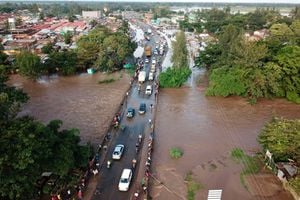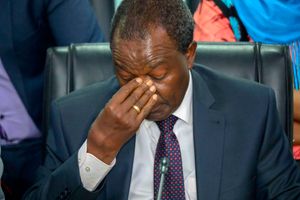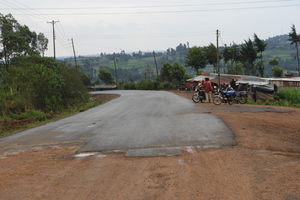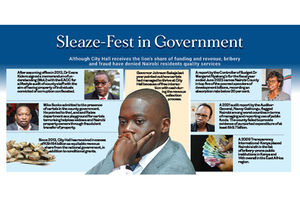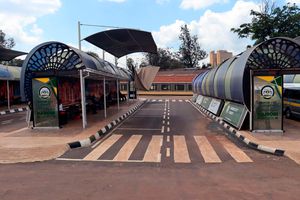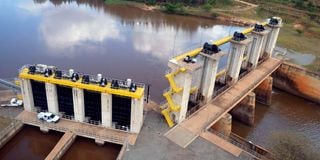
Sondu- Miriu hydroelectric power plant in Kisumu County on February 14, 2018.
An audit that sampled 32 multi-billion-shillings projects has exposed costly mistakes made by officials that expose Kenyans to legal and operational liabilities, including up to Sh55 billion in commitment fees for loans not taken or fully absorbed, and the shame of stalled developments that hurt taxpayers.
Even worse, the audit showed that taxpayers are repaying loans amounting to billions of shillings to projects they do not know anything about as they were never involved in the process as required.
In what could also expose Kenyans to further pain and liabilities, the report showed that out of the 32 loan projects sampled, only five had the legal opinion of the Attorney General.
The special audit report dated June 2024, which was tabled before the National Assembly Debt and Privatisation Committee, looks at debt servicing of Kenya’s loans audit report covered external debt servicing activities and transactions from July 1, 2020, to June 2023.
In the report, Auditor General Nancy Gathungu also says out of the 32 sampled project loans, stakeholders were only involved in 10 while others had no documentation on whether the public was engaged before the commencement of the project.
22 project loans
“The remaining 22 project loans had no documentation or evidence to support public participation and therefore the audit could not establish if project stakeholders’ views were incorporated before project implementation,” Ms Gathungu says.
“Lack of public participation by stakeholders and beneficiaries may lead to lack of ownership by the public, contributing to limited project sustainability beyond completion,” reads the report.
The objective of the audit was to determine if the process of servicing external loans was adhered to as required under relevant laws, regulations and agreements and whether avoidable penalties were minimised.
The audit reviewed processes regarding servicing of external loans including budgeting processing, approvals and payment of external debt services.
Ms Gathungu says more than 50 per cent of the external debt portfolio is denominated in major foreign currencies including the US Dollar at 68.1 per cent, Euro at 19.8 per cent, Chinese Yuan at 5.4 per cent, Japanese Yen at 4.2 per cent, Great Britain Pound at 2.3 per cent while other currencies account for 0.2 per cent.
“External debt is therefore exposed to the volatility of the foreign exchange rates. This implies that over 50 per cent proportion of revenue is used to service debt,” reads the report.
The report revealed that at least five sampled project loans had stalled.
“Out of the 32 sampled project loans, 17 were completed, six had stalled, six were ongoing, two had been cancelled and one had missing documentation,” the report says.

The Kimira Oluch Smallholder Farm Irrigation Project in Homa Bay County.
The audit lists five stalled projects as the Kimira-Oluch Smallholder Farm improvement project due to the government not releasing Sh3.9 billion in co-financing; Sondu-Homa Bay-Awendo Electrification project as Kenya Electricity Transmission Company (Ketraco) had not made a decision on it for four years; and Kisii hospital cancer care treatment centre as creditors had not issued no-objection letters.
Others are the Mombasa Gate Bridge construction where the consultant is probing a case of a design different from the feasibility study; and Kenyatta University Teaching, Research and Referral Hospital where there were questions of medical education students unable to access the facility, an issue that has since been resolved by Parliament.
Those cancelled are the Kilimani-Hurlingham-Ngong Road-State House-Lavington roads and the Kileleshwa-Westlands-Parklands-Ngara-Riverside, both valued at a total of Sh17 billion.
The report revealed that out of the 32 sampled project loans, only 18 had feasibility studies that clearly indicated the need for the projects were provided for review.
“Feasibility studies for the remaining 14 project loans were not provided for review hence the audit could not determine the necessity of the projects,” reads the report.
On the approvals of the projects, Ms Gathungu says only 11 out of the 32 sampled loan projects had correspondences of approval documents while the documents relating to the remaining 21 were not provided for audit review.
Ms Gathungu has warned that lack of project approvals may lead to double financing of similar projects and the incurrence of costs outside the budget.
The report also revealed that there is a lack of transparency in the loan negotiations as out of 32 sampled projects only two- Sondu-Miriu hydropower projects and Sang’oro power plant provided information on loan negotiations.
Ms Gathungu expressed fears that in the absence of the loan negotiation documents, there is the risk of inadequate understanding and implications of financing terms and conditions across parties of the project loans due to lack of documentation.
The report also says that only five of the project loans had legal opinions from the Attorney General while 27 of the projects had no such approvals.
In the absence of a legal opinion, Ms Gathungu warns that the government risks being exposed to the terms of the loans.
“This may lead to implementing agencies not being able to meet conditions precedent promptly and may further expose the government to unfavourable financing terms thus leading to the incurrence of avoidable cost,” reads the report.
According to the report, in the Financial Year 2022/2023, the government cumulatively paid a commitment fee of Sh55.8 billion to external loans.
On the sampled 32 loan projects, the government paid Sh1.9 billion as a commitment fee.
A commitment fee is a fee charged by a creditor to a borrower to compensate the creditor for its commitment to put in the loan funds.
Some of the reasons for paying the commitment fee include delays in the drawdown of the first disbursement, undrawn balances after project completion, and wastages of up to Sh626 million due to delay in the cancellation of the underground electric power distribution network project in Nairobi.

One of Olkaria geothermal project's units within Hell's Gate National Park in Naivasha on October 15, 2024.
For instance, the report notes that of the 32 projects sampled, only two-provision of drilling materials for 80 Geothermal wells at Olkaria field project and the Sondu Miriu hydropower project drew down the first disbursement on time.
Subsidiary loan agreement
The report shows the other projects did not draw down funds due to the inability to meet conditions which included signing of the subsidiary loan agreement, delays in signing of the power purchase agreement, delays in compensation for acquisition of way leaves, delays related to issuing of no objection certificates for the work to start on site and provision of government counterpart funding.
Under the undrawn balance, Ms Gathungu notes that although some projects such as the Olkaria Three have been completed, KenGen continues to retain an undrawn balance of Sh12.5 billion account balances ranging between three months to seven years.
Ms Gathungu says the undrawn loan balance by KenGen is attracting an unnecessary commitment fee of Sh70 million.
The Auditor-General further revealed the wastage of taxpayers in payment of penalties and commitment fees from the cancellation of the project.
For instance, the report says the government paid a commitment fee of Sh474 million for underground electric power distribution network projects undertaken in Kilimani-Hurlingham-Ngong road-State House-Lavington and Kileleshwa-Westlands-Parklands-Ngara-Riverside roads because cancellation took five years.
“In addition, the two projects incurred interests due to the delayed payments of avoidable commitment fees and other charges amounting to Sh626 million,” reads the report.
The projects were undertaken by China Shanghai Corporation for Foreign Economic and Technological Corporation and Nari Group Corporation.
The Auditor General expressed fears that taxpayers may not get value for money and government risks paying more in terms of penalties for various stalled projects as donors stay away from completion of the projects due to unfiled promises from the government side.
She warned that the stalled projects may be dilapidated and will need repairs when the works begin again, a cost which will be borne by taxpayers in addition to penalties that will be charged by contractors.
Ms Gathungu says in her report that the audit team experienced hindrances of initial project documentation from the National Treasury and other implementing ministries and agencies.
According to the report, 15 out of the 32 project loans sampled are dated between 1995 to 2010 meaning that key project personnel had either left employment upon completion of the project or due to retirement.
“The audit mitigated the challenges by conducting similar information through interviews and physical verification,” reads the report.
Debt servicing payments
In the period under review, Ms Gathungu says debt servicing payments were over budget by an average of 10 percent compared to actual CBK debt servicing payments.
The debt managers told the audit team that during budget preparation of service obligations, there is normally a five percent provision to cater for foreign exchange fluctuations as the loans fall due, this variation is normally agreed upon by the International Monetary Fund (IMF) also.
The report also says the Controller of Budget approved amounts varied with the CBK actual paid amounts.
For instance, the repayments for the FYs 2020/2021 and 2021/2022 the repayments were less than the CoB-approved amounts by Sh1.4 billion and Sh83 billion respectively.
In the FY 2022/2023, the actual repayments were more by Sh77 billion.
The variances according to the report were attributed to exchequer requisitions being done using the CBK published exchange rates while seeking CoB approval but they are normally reconciled on a monthly basis.
According to the Auditor General, the high interest rates and depreciating shilling have seen the debt servicing expenditure increase by Sh415 billion from Sh746 billion in the 2018/2019 financial year to Sh1.1 trillion in the 2022/2023 financial year.
National Treasury Cabinet Secretary John Mbadi said during his vetting, he will make public all the details of the country’s public so that Kenyans can know who they owe and at what cost.
“Which are these secret agreements stopping us from knowing who we owe money to? Kenyans should know who they owe and at what rate. I will make this public,” Mr Mbadi told the vetting panel.
In September, Mr Mbadi said he had already engaged the Auditor General to audit all the public debt.
Last week, Mr Mbadi told MPs that he was yet to receive the report and that it will be made public.

